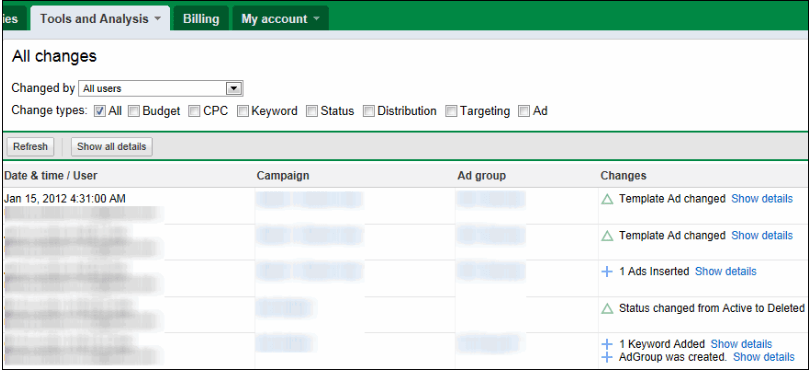At Fujisan, there are a handful of pitfalls we regularly see when conducting PPC audits or taking over account management. Otherwise well-run Google Ads accounts will end up underperforming due to just one or two neglected factors.
Here are some of the things we run into that will hurt your digital marketing efforts:
Few or No Optimizations in the Change History
The change history is a tool that allows you to view any changes you’ve made to your Google Ads account — all changes from the past two years will show up there. This is one of the first things we review when looking at a new client’s account. We have found that in most cases, the people who are unhappy with their online marketing performance are also the people with little or no history of changes on their account.

Example of Change History
If there is no history of changes, that means there’s no history of you attempting to optimize or adapt your campaigns. When we see this in a client’s account, we immediately know they haven’t had dedicated eyes on their account and have been neglecting their marketing efforts. We call this “set it and forget it.” Compared to traditional marketing, digital marketing gives you the precision and insight to constantly learn, evolve, and improve your performance; fail to heed that, and your account will surely under perform.
Incorrect or Outdated Conversion Tracking
Creating, verifying, and optimizing your conversion tracking is critical to digital marketing success. After all, if driving conversions is the goal of your digital marketing campaigns, not being able to track them accurately means you won’t have accurate insights into the very purpose of all your work. A common pitfall we see with conversions is when clients are either no longer tracking conversions or if their conversion tracking is unverified. You never want uncertainty in your data, especially not here.
On top of that, another mistake we see is when someone utilizes the wrong attribution model — for example, first or last click — instead of an attribution model that gives credit to each leg of the journey. The road to each conversion is a winding process; failing to accurately credit the various steps means you’re likely to neglect them, resulting in future conversion shortfalls. In the end, the steps to conversion are the foundation of your success. Don’t take them for granted.
Primarily Using Broad Match Keywords
Being overly reliant on broad match keywords can doom all your campaign efforts. This is because these keywords allow Google to bid on searches with synonyms, misspellings, related searches, or variations of your keyword.
What usually happens here is that one specific keyword takes up the majority of spend in a campaign or ad group, subsequently hindering the performance of your other keywords and potentially wasting your budget on irrelevant clicks. Broad match keywords are the default setting, but they tend to result in quantity over quality, which means spending more of your budget while bringing in fewer conversions or sales. Remember that while broad match keywords have some value in doses, exact match, phrase match, and modified broad match settings are your friends.
Poor Ad Scheduling (Or None At All)
Ad scheduling, also called day parting, allows you to increase or decrease bids during certain times of day or days of the week, as well as control which times of the day your ads will show. This allows you to only advertise (or more heavily advertise) during times that tend to see better results.
When looking at accounts with suboptimal performance, we often find that this feature is not utilized. Alternatively — and barely any better — we’ll find that it was implemented once and then never looked at and optimized since. (Remember back to our first thoughts on change history: “Set it and forget it” never bodes well.) Seeing as you can bid more during specific times and less during less fruitful hours, ad scheduling is a great tool that unfortunately is often lost in the weeds. If you want to ensure your budget is being spent efficiently, ad scheduling is a must.
Testing (Or, More Accurately, Lack Thereof)
Whether it’s about keywords, location targeting, ad copy, etc., testing is essential to optimizing an account. Really, it’s impossible for an advertiser to know how well their account can perform without testing, learning, and adapting to optimize based on what they’ve learned from tests.

Example of Analytics Report
When reviewing accounts, we can easily tell if the account is being frequently tested or not. When not, we’ll see no or few campaign drafts, experiments, or even paused ads. And when we know an account is not being tested often, we know it subsequently isn’t being optimized regularly. This is a vastly underutilized tool, which stinks because by not testing frequently you’re undermining the ceiling of your digital campaigns.
No Negative Keywords
This is similar to the aforementioned reasoning behind not over-utilizing broad match keywords. That is, quality matches are more efficient, and more efficient searches make your budget go further.
Often when taking over an underperforming account, the negative keyword list is either non-existent or barely started. But since most terms can relate to many subjects, negative keywords are essential to bidding on related searches. For example, if you’re running a campaign for art paint brushes and have the word “brush” as a keyword, you’d want to negate searches looking for dog brushes, hairbrushes, or even house paint brushes. Otherwise, your budget will be wasted on a bunch of people looking for other brushes that have zero interest in your product. It’s pretty much throwing money in a trash compactor to not have negative keywords, which should be all the incentive necessary.
Not Fully Utilizing Ad Extensions
While the scope and variety of ad extensions might feel overwhelming at first, these little guys are your friends. Different extensions have different purposes, but they all are essentially an extension of your ad that provides users with more information about your business. Plus, they occupy a larger area of ad real estate. That is two birds with one stone!
When taking over an account, we can see general ad extensions placed across therein. We’ll also sometimes see a lack of extensions, or only one or two. For the reasons just mentioned, that’s not ideal. If you still feel a bit overwhelmed, think of ad extensions as tools that do all the work to make your ads more relevant. Framed that way, there’s no reason not to have a bunch of them!
Generic (or Just Plain Bad) Ad Copy
In underperforming accounts, we often see PPC ad copy missing crucial elements (like no third headline or second description) or generic ad copy spread across many campaigns and ad groups, rather than writing unique ads per ad group. While the issue with missing copy is intuitive, the issue with the latter involves the nature of digital marketing: its greatest advantage is that you can create messages for specific audiences that are tailored just to them. If you have that at your fingertips but are treating your diverse target audience as a monolith? Well, of course your words won’t resonate with many (or any) of them.
This is a major benefit of digital over traditional marketing. Traditionally, your only option was to blast one single message across an entire population — one that had varying views, life experiences, wants, and needs — and just hope that message stuck with a small subgroup therein. It was (and still is) pretty wasteful. So, continuing that ad copy technique when digital gives you the means to vastly improve in this area with different messaging for different people? It’s just plain silly.
Wasted Spend
In a way, this is all-of-the-above combined into one. Wasted spend on an account is usually tied to many of the above pitfalls. Lack of optimizations and the idea that you can set and forget your account is the main culprit. In an extreme example, we once saw an account that had spent over $20,000 in ad spend with only two conversions driven. Holy crud.
“Wasted spend” is a symptom, not a cause. (Although, needless to say, it can end up causing a whole bunch of other problems.) If you feel your digital marketing resources are being wasted, check up on the issues we discussed here. Otherwise, if all those aspects of your account are running like clockwork and you still feel you’re not performing as well as possible, we at Fujisan are always happy to get on the case!




